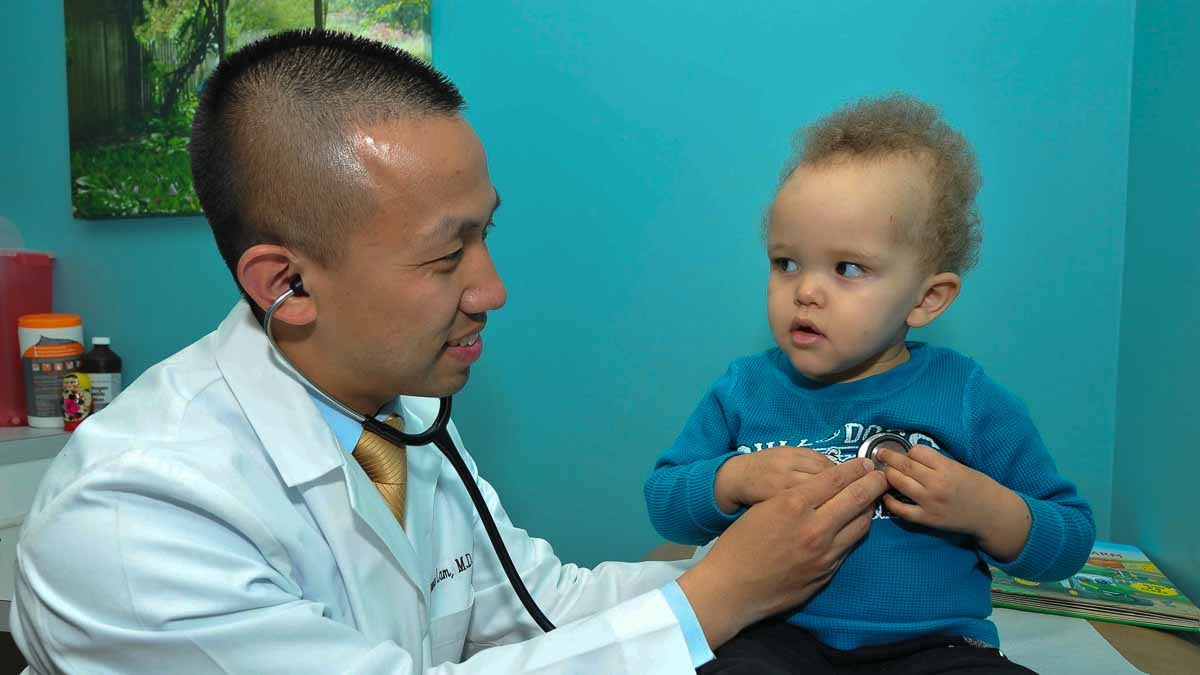Why do so few doctors vote?
Listen
Dr. Clarence Lam takes care of a young patient. (Mathew Karmel/for WHYY)
One in four physicians didn’t vote in all of the last three presidential elections. So, what’s their excuse?
People in the medical profession aren’t great voters. At election time, we turn out in lower numbers than farmers, teachers, and lawyers…especially lawyers.
Researchers at the University of Pennsylvania found that fewer than 49 percent of physicians voted in the 2000 election, for example. That’s compared to lawyers, who turned out at almost 70 percent. More than 800,000 strong, doctors could be a powerful voting block in the United States at election time. So, why the apathy?
Dr. Nidhi Goel, a hospitalist at the University of Maryland Medical Center in Baltimore, offers up a suggestion: “I think everybody will use the excuse of time, which is fair, but then kind of not so much. Because we can find time to do things that are important.”
And she’s right. Lack of time is a key reason doctors give for not voting. Researchers who study voting patterns have theorized that doctors vote in lower numbers because medical schools attract people who like science more than civics. Other studies have indicated that many doctors feel like their work has enough social purpose, so they can skip voting, guilt-free.
Goel says she’s also struck by the tension that can come with politics.
“Now in the current political environment, it can be really challenging to have these discussions openly,” she winces. “And it can become very adversarial. It can feel very personal.”
Think about it, do you really want to know that your doctor is voting for the candidate you can’t stand? Some doctors stay out of politics for the same reason, so they don’t alienate their patients.
When I ask 32-year-old cardiologist Jeremy Pollock why physicians are bad voters, he gives me a reason that the medical community understands well but that would surprise many patients.
“From the very beginning, we are not taught anything about the political or the business side of medicine,” says Pollock. “You might have one little 20 minute personal finance class in medical school. You might have a financial advisor try to come get your money in residency, but there is no emphasis. This is not institutionalized as important.”
To his point, a recent newsletter from the American Medical Association listed nine issues that will affect the work and livelihood of physicians this election cycle, including: Medicare reform, insurance regulations, issues surrounding electronic health records, student debt relief, telemedicine, prescription drug abuse and addiction, and prescription drug pricing. These are not binary topics. They are complex and require serious study to fully understand.
“Every day, I’m just trying to learn how to be a cardiologist, and that breadth of information that I’m responsible for is unbelievably scary,” says Pollock. “So then you add on top of that, ‘learn about the politics of medicine!’ There’s no way. So it’s this helplessness.”
Pollock’s point is that, despite spending decades in training, when it comes to policy, physicians can feel undereducated, too. And it just so happens that there are groups who are working to change all this.
In a ’70s-style auditorium on the medical campus of the University of Maryland, a few dozen doctors-to-be are eating pizza and hoping to feel less helpless. This is a meeting of Citizen Physicians—a grassroots movement that started at Brown University with the mission of helping future doctors better understand those tricky policy topics.
One of tonight’s speakers is Dr. Clarence Lam. He’s young and energetic, a rising star in the Maryland General Assembly where he is one of four physicians. After the panel, I asked him why he thinks doctors stay out of politics.
“We are very linear thinkers,” Lam says. “We base all our decisions, or we try to, on data, on things that we see, on observations. That’s not necessarily the case in policy, where you’re trying to convince people. From a physician’s standpoint, from a scientist’s standpoint, it’s incredibly frustrating to realize that the data might be completely outweighed by one or two stories.”
Lam warns that politicians also make decisions based on who shows up to vote: “If they see that the physician community doesn’t come out to vote as often as, say, the attorney community, then they will probably be more likely to listen to the attorney community than to physicians. Because you don’t turn out to vote.”
It turns out, taking good care of patients includes showing up Tuesday morning to pull that lever.
WHYY is your source for fact-based, in-depth journalism and information. As a nonprofit organization, we rely on financial support from readers like you. Please give today.



